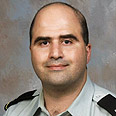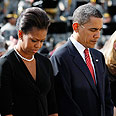
Major Nidal Malik
Photo: Reuters

Obama and wife at Fort Hood victims' memorial
Photo: Reuters
President Barack Obama has ordered a review to determine if warning signs were mishandled of contact between the Fort Hood shooting rampage suspect and a radical Islamic cleric who encouraged Muslims to kill US troops in Iraq.
Dangerous Contacts
ABC network reveals US intelligence agencies had prior knowledge of Maj. Nidal Hasan's ties to global terror organization; not clear if military sources were informed
The order came as Major Nidal Malik Hasan was charged Thursday with 13 counts of premeditated murder in the attack at the sprawling Texas post that also left 29 people injured. The Army psychiatrist was shot several times and remains hospitalized. He could face the death penalty if convicted.
Obama said he wanted all intelligence related to Hasan preserved and reviewed to determine whether it was properly shared and acted upon within the government. The first results are due November 30. John Brennan, assistant to the president for homeland security and counterterrorism, will oversee the review.
Members of Congress also are pressing for a full investigation into why Hasan was not detected and stopped. A Senate hearing on Hasan is scheduled for next week.
A joint terrorism task force overseen by the FBI learned late last year of Hasan's repeated contact with the cleric. The FBI said the task force did not refer early information about Hasan to superiors because it concluded he wasn't linked to terrorism.
Representative Peter Hoekstra, the top Republican on the House Intelligence Committee, and others have called for a full examination of what agencies knew about Hasan's contacts with a radical imam and others of concern to the US, and what they did with the information. Hoekstra confirmed this week that the US government knew of about 10 to 20 e-mails between Hasan and a radical imam, beginning in December 2008.
Staff overseeing Hasan's training had reported that he was at times belligerent in his frequent discussions about his Muslim faith and was considered a lazy worker, according to a military official familiar but not authorized to speak publicly about several group discussions about Hasan.
Army officials have said they believe Hasan acted alone when he jumped on a table with two handguns last week, shouted "Allahu akbar" and opened fire inside a building at Fort Hood. The 13 people killed included a pregnant soldier and at least three other mental health professionals.
Hasan could face additional charges, said Army Criminal Investigation Command spokesman Chris Grey. It had not been decided whether to charge Hasan with the death of the soldier's unborn child, officials told The Associated Press on condition of anonymity because they were not authorized to speak about the case publicly.
Hasan was charged in the hospital without his lawyers present, said John Galligan, his civilian attorney.
"What I find disturbing is that my client is in ICU, and he's 150 miles south of his defense counsel, and he's being served with the charges," he told The Associated Press. "Given his status as a patient, I'm troubled by this procedure and that I'm not there. I'm in the dark, and that shouldn't be the case. I am mad."
Months before the shootings, doctors and staff overseeing Hasan's training reported viewing him at times as defensive and argumentative in his frequent discussions of his faith, according to the military official familiar with several group discussions about Hasan. The official was not authorized to speak publicly about the meetings and spoke on condition of anonymity.
Hasan was characterized as a mediocre student and lazy worker, which concerned the doctors and staff at Walter Reed Army Medical Center and the Uniformed Services University of the Health Sciences, a military medical school in Bethesda, Md., the official said.
'America killing Muslims in Middle East'
Even outside the military, Hasan's behavior drew attention. Golam Akhter, a civil engineer from Bethesda, Md., said Thursday that he had spoken with Hasan about 10 times at the Muslim Community Center in Silver Spring before Hasan left for Texas last summer.
"He used to not believe that 9/11 was solely the work of Middle East people," Akhter said. "His main thing was, 'America is killing Muslims in the Middle East.' That made him very, very upset."
Akhter said he sensed that Hasan was "a troubled man" and feels guilty for not alerting others.
"I tried to convince him to try to be a moderate Muslim," Akhter said.
Hasan repeatedly referred to his strong religious views in discussions with classmates at Walter Reed, his superiors and even in his research work, the military official said. His behavior, while at times perceived as intense and combative, was not unlike the zeal of others with strong religious views.
But some doctors and staff were concerned that their unfamiliarity with the Muslim faith would lead them to unfairly single out Hasan's behavior, the official said.
Some questioned Hasan's sympathies as an Army psychiatrist, whether he would be more aligned with Muslims fighting US troops. There also was some concern about whether he should continue to serve in the military, the official said.
But they saw no signs of mental problems, no risk factors that would predict violent behavior. And the group discussed other factors that suggested Hasan would continue to thrive in the military, factors that mitigated their concerns, the official said.
Defense Secretary Robert Gates said Thursday he was appalled at news leaks about the investigation into last week's deadly shootings at Fort Hood.
"Frankly if I found out with high confidence anybody who's leaking on the Department of Defense, who that was, that would probably be a career-ender," he told reporters traveling with him to Oshkosh, Wis. "Everybody ought to shut up."















